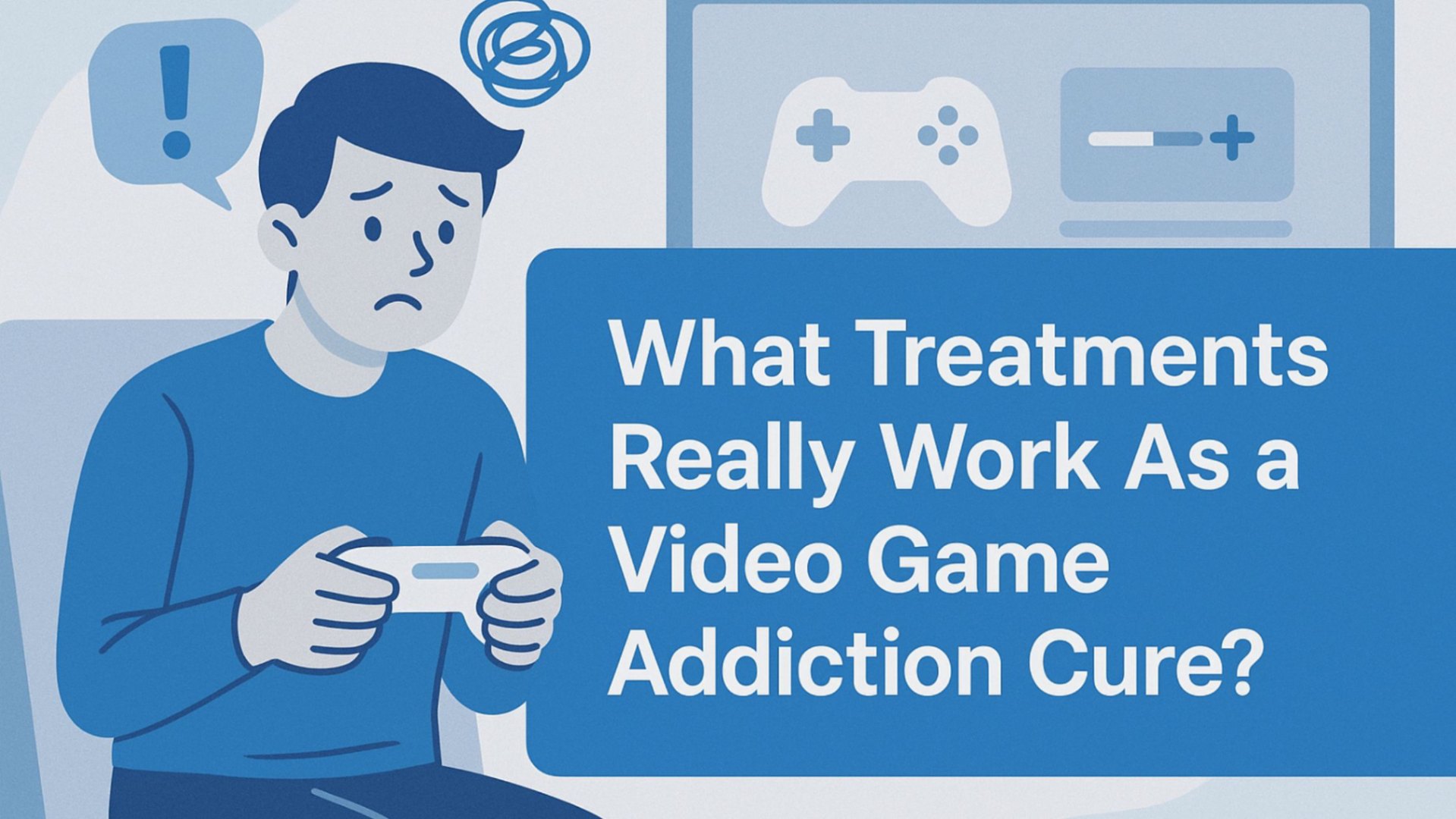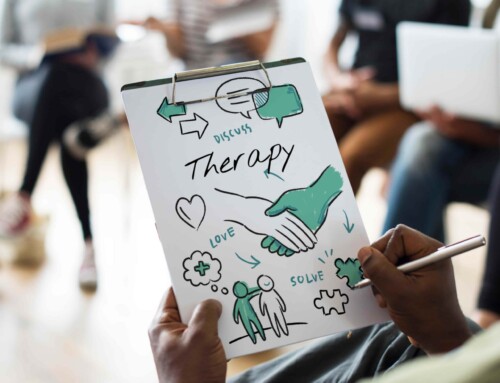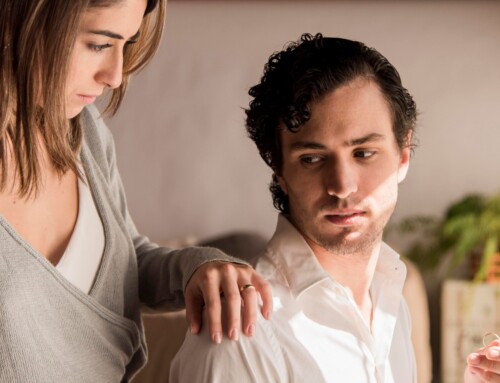What Treatments Really Work As A Video Game Addiction Cure?
TL;DR
|
|---|
For many young people and adults, video gaming can shift from a harmless pastime to a habit that disrupts daily life. Addiction to gaming is described in the American Psychiatric Association’s Diagnostic and Statistical Manual of Mental Disorders (DSM-5-TR), where it is referred to as Internet Gaming Disorder (IGD) and recommended for further research.
At Total Life Counseling, we regularly meet individuals and families struggling with this issue. Our team provides personalized care and guidance, helping clients set healthy boundaries, restore balance, and rebuild connections in real life.
In this blog, we’ll explore what an effective video game addiction cure looks like, discuss therapies that work, share lifestyle strategies, and answer common questions such as can video game addiction be cured or how to help someone with video game addiction.
How Video Game Addiction Differs From Healthy Gaming?
While gaming itself isn’t harmful, the difference lies in how it’s approached and its impact on daily life. Here’s a table to help you see when gaming stays healthy and when it turns into addiction.
|
Healthy Gaming |
Video Game Addiction |
|---|---|
|
Played in moderation with clear time limits |
Spends excessive gaming time with unsuccessful attempts to cut back |
|
Enhances cognitive skills and problem-solving |
Interferes with daily activities like school, work, and sleep |
|
Used for fun, relaxation, and social connection |
Leads to withdrawal symptoms of video game addiction such as irritability or anxiety when not gaming |
|
Balanced with real life responsibilities and hobbies |
Strains relationships with family members and encourages a sedentary lifestyle |
|
Easy to pause or stop without distress |
Creates compulsive patterns that may worsen mental health issues like depression or ADHD |
Healthy gaming is intentional. It fits into a person’s lifestyle without disrupting work, relationships, or health. Addiction, however, changes the role of games completely.
They stop being just a source of enjoyment and become a coping mechanism, often at the expense of physical and emotional wellbeing.
The difference between healthy gaming and video game addiction lies not only in how much time is spent playing but in how strongly gaming begins to dominate someone’s choices and priorities.
If you or a loved one is struggling, Book a session with our counselors today.
What Are The Most Effective Treatments For Video Game Addiction?
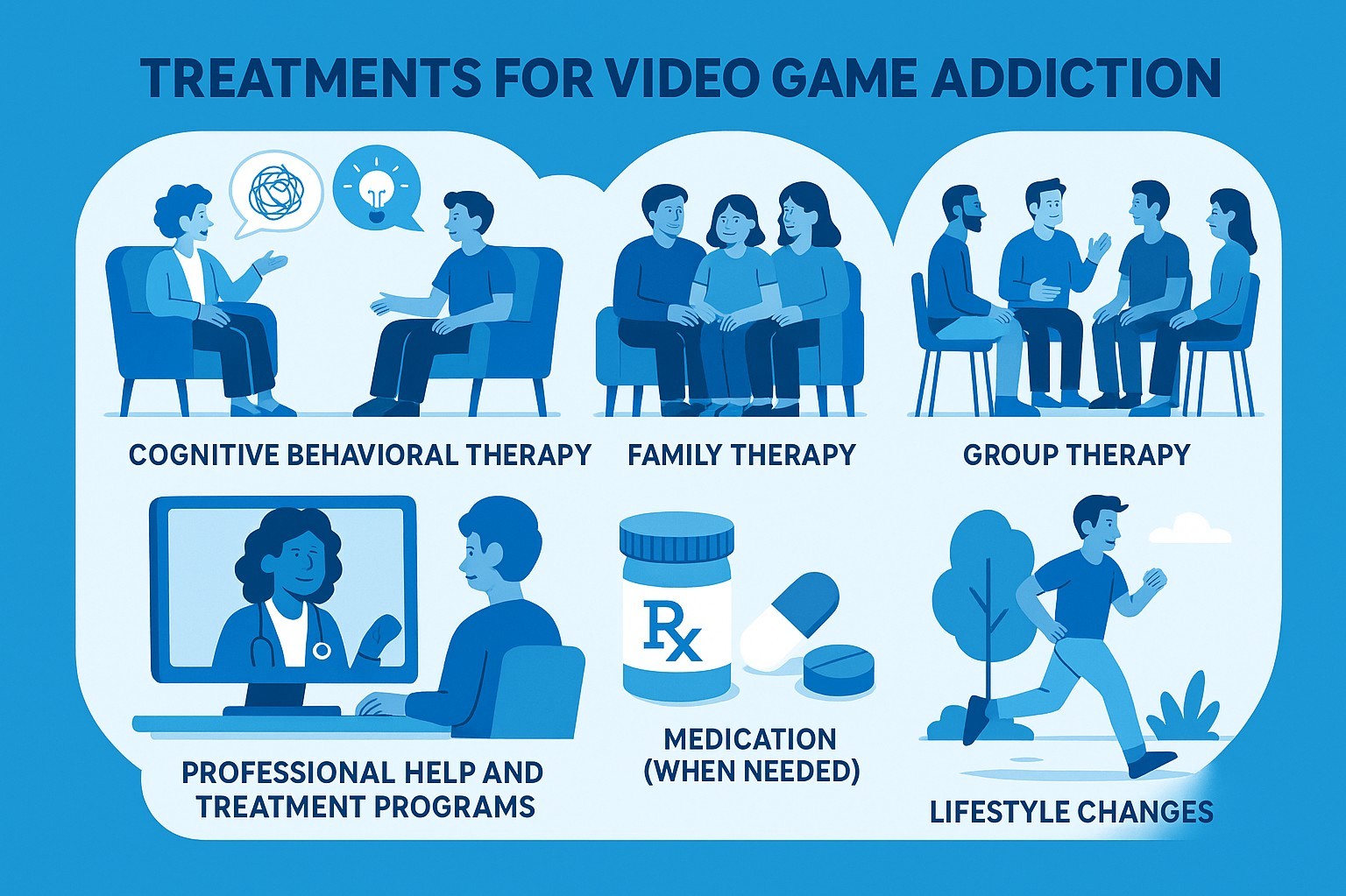
How to cure video game addiction? Well, there isn’t a single “magic fix” for gaming addiction. Recovery usually involves a mix of therapies, support systems, and lifestyle changes that work together. Here’s a closer look at the treatments that are most effective:
1. Cognitive Behavioral Therapy (CBT): Changing Thought Patterns
Cognitive Behavioral Therapy is one of the most researched and recommended ways to cure video game addiction. It focuses on helping individuals identify the thought patterns that lead to compulsive gaming, such as using games as an escape from stress, loneliness, or low self-esteem.
Therapists then teach practical coping strategies, like breaking big tasks into smaller steps, practicing mindfulness, or using healthier outlets for stress. Over time, CBT builds self-control and helps reduce the urge to turn to games automatically.
2. Family Therapy: Healing Relationships At Home
Gaming struggles rarely affect just the individual, they impact family members too. Family therapy brings everyone together, helping parents, partners, or siblings learn how to set boundaries, communicate better, and create a home environment that supports recovery.
For children and teens, this often means developing consistent routines, setting clear time limits, and encouraging more real-world activities.
3. Group Therapy: Finding Strength In Shared Experiences
For many, it helps to know they’re not the only ones struggling. Group therapy provides a safe space to share experiences, learn from others, and build accountability.
It also offers moral support, which can be powerful in moments of discouragement. People who ask how to get rid of video game addiction often find that hearing success stories or progress from peers keeps them motivated to push through their own challenges.
Learn more about supportive approaches like play therapy that encourage healing through shared experiences.
4. Professional Help: Finding The Right Program
In more severe cases, seeking professional help at a specialized treatment center may be the best option. These centers often run structured treatment programs designed specifically for gaming disorder or other forms of internet addiction.
Programs may include one-on-one therapy, group sessions, skill-building workshops, and strategies to restore balance in daily activities. Having the guidance of a mental health professional ensures the individual gets a tailored recovery plan that addresses both the addiction and any underlying mental health issues.
5. Medication: Extra Help If Needed
While there’s no medication designed solely for gaming addiction, doctors may prescribe treatment if other conditions are present.
For example, people with depression, anxiety, or attention deficit hyperactivity disorder (ADHD) may benefit from medication that helps stabilize mood, reduce impulsivity, or improve focus.
Medication is never a stand-alone solution; it’s always used alongside therapy and lifestyle changes to support recovery.
6. Lifestyle Changes: Building Healthy Habits That Last
Finally, therapy works best when it’s paired with changes in everyday life. That means reducing screen time, setting structured schedules, and finding healthier replacements for games.
New hobbies like sports, art, or outdoor activities can fill the gap and provide enjoyment without the risks of overuse. Improving sleep routines, exercising regularly, and reconnecting with friends face-to-face can also make a huge difference in overall wellbeing.
Hope and healing start with understanding. Join our masterclass to learn supportive ways to guide recovery.
How to Help Someone Break Free From Video Game Addiction?
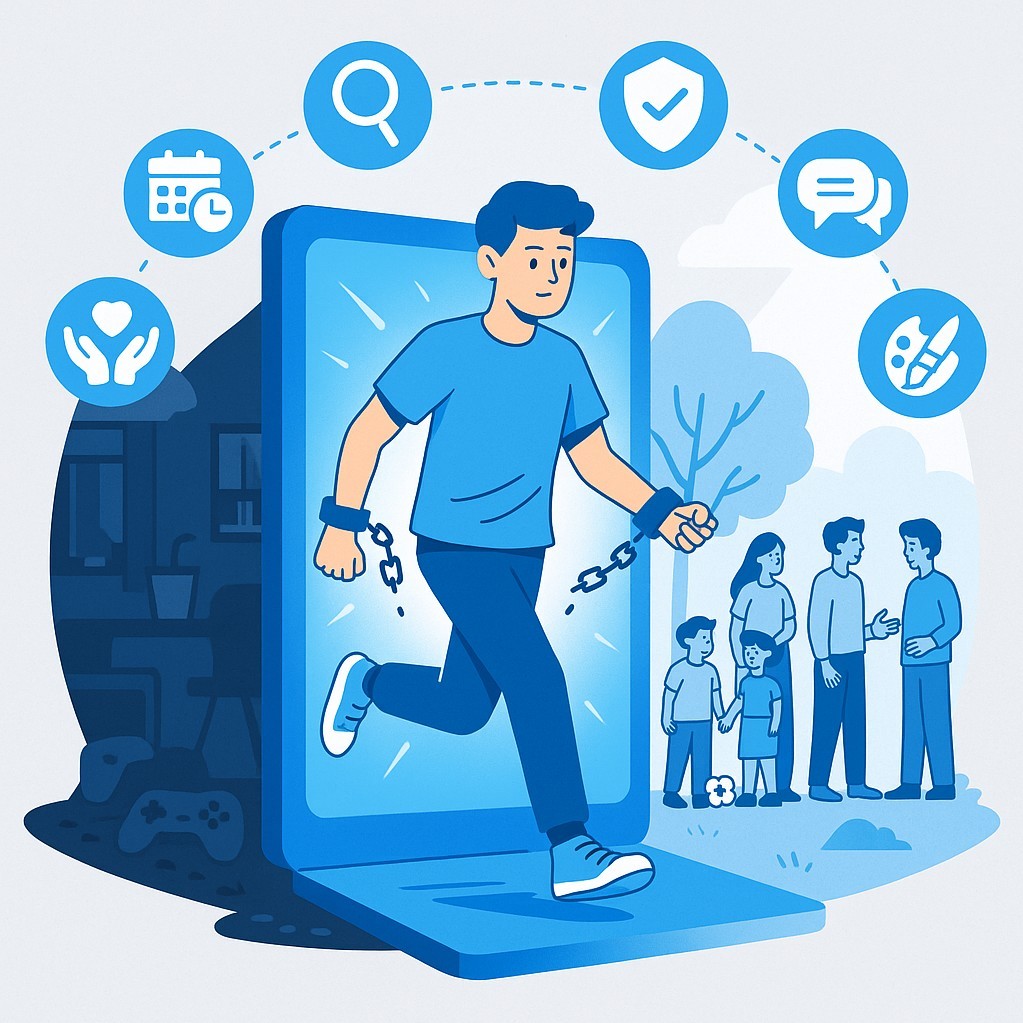
Breaking free from video game addiction does not happen overnight. It is a journey that takes patience, support, and small but steady changes. Here are some steps to cure video game addiction:
Step 1: Help Them Recognize The Problem
Acknowledging the issue is often the hardest step because many children or teens see gaming as harmless fun. Parents can approach this gently by observing patterns and pointing out the changes without judgment.
For example, you might say, “I’ve noticed you seem really tired in the mornings since you’ve been gaming late at night” instead of accusing them of being “addicted.”
Watch for red flags like declining grades, skipped meals, withdrawal from family or friends, or irritability when games are taken away.
Helping your child understand the difference between healthy gaming and unhealthy patterns makes them more open to accepting support.
For a deeper understanding, watch this video on what video game addiction looks like and how to get help.
Step 2: Support Them In Setting Clear Boundaries
Boundaries should be consistent, but also fair and realistic. Start with small, manageable rules rather than sudden bans that can backfire. For example:
- No gaming during meals or family time.
- Screen-free hours before bedtime to improve sleep.
- Setting a daily limit, like one or two hours, with breaks in between.
Involve your child in setting these boundaries so they feel a sense of control. This helps reduce resistance and teaches self-discipline instead of relying only on external enforcement.
Step 3: Encourage Professional Guidance
If gaming has started to disrupt school, work, or mental health, professional help is often necessary. A therapist can provide tools that parents might struggle to teach on their own.
- Cognitive Behavioral Therapy (CBT): Helps kids reframe negative thinking patterns and find healthier coping strategies instead of escaping into games.
- Family Therapy: Improves communication at home, helping parents and siblings set consistent rules while reducing conflict.
- Group Therapy: Gives children or teens a chance to connect with peers who are facing the same challenges, which can reduce feelings of isolation.
Parents can support this process by being involved like attending family sessions, following through on therapist recommendations, and reinforcing what’s learned in therapy at home.
Looking for real solutions? explore our screen addiction counseling services to get expert support and practical strategies that help restore balance.
Step 4: Suggest Healthier Alternatives
Gaming often becomes addictive because it fills specific needs: achievement, escape, or social connection. To reduce reliance on games, help your child discover real-world activities that meet those same needs. For example:
- If they enjoy competition, encourage team sports or board games.
- If they like creativity, suggest art, music, or coding projects.
- If they crave social connection, help them join a club, youth group, or volunteer activity.
Replacing gaming with enjoyable, meaningful alternatives ensures they don’t feel like something is simply being “taken away.” Instead, they begin to find fulfillment in other areas of life.
Step 5: Be Part Of Their Support System
Children and teens are more likely to succeed when they feel understood. Criticism or punishment often drives them deeper into gaming. Instead, show encouragement by acknowledging progress: “I noticed you stopped gaming earlier last night, that was a good choice.”
Family involvement is crucial. By planning activities together, setting shared goals, and celebrating small wins, parents can show support that keeps children motivated and makes recovery feel like a team effort.
Step 6: Help Them Stay Committed Long-Term
Breaking free from gaming addiction isn’t a straight path. Instead of seeing them as failure, frame them as opportunities to learn. For example, if your child relapses into late-night gaming, talk about what triggered it and what could be done differently next time.
Long-term success comes from consistency. Encourage balance by reinforcing good sleep habits, healthy routines, and involvement in non-digital activities. Over time, your child will develop stronger self-control and rely less on external rules.
Also read: What’s the best way to help kids addicted to video games?
How Total Life Counseling Can Help?
At Total Life Counseling, we know gaming struggles can affect far more than screen time. They can lower confidence, disrupt school or work performance, and create stress for the whole family. Our mission is to provide care that feels both practical and compassionate, helping individuals and families find lasting balance.
Here’s what makes our approach different:
- Personalized treatment plans that may include therapy options like CBT, family therapy, or group support
- Guidance on healthy routines, with strategies to set boundaries and manage gaming in moderation
- Support for family members, so recovery continues at home, not just in our sessions
- Compassionate professionals who bring expertise in addiction and mental health, combined with genuine understanding
Whether you are a parent worried about your child’s gaming, or an adult who feels it has started to take over, our team is here to support you. Together, we can work on building healthier routines, stronger relationships, and a life that feels more balanced.
Take the first step, Schedule your session with us today.
Final Thoughts
Breaking free from video game addiction can feel overwhelming, but you don’t have to do it alone. Recovery isn’t about giving up what you love, it’s about learning to enjoy games without losing sight of your health, relationships, and goals.
With patience, support, and the right guidance, it’s possible to regain control and rediscover joy in life beyond the screen.
Frequently Asked Questions
What are the main causes of video game addiction?
Video game addiction stems from psychological, social, and biological factors like stress escape, dopamine-driven rewards, weak boundaries, peer pressure, and mental health issues such as ADHD or depression, making gaming a compulsive coping mechanism.
Are there proven ways to quit video game addiction without therapy?
Yes, self-help strategies can be effective. Setting strict limits on game time, removing devices from the bedroom, and finding new hobbies are proven daily habits. However, if these attempts are unsuccessful, professional help is recommended to achieve lasting change.
How can parents identify and address gaming addiction in their children?
Parents can identify signs of video game addiction like falling grades, loss of interest in other activities, and irritability when not gaming. They can address it with parental guidance by setting firm limits on gaming time and seeking professional help if the behavior persists.
What steps can parents take to help their child overcome video game addiction?
Parents can set consistent screen time limits, encourage alternative activities, create tech-free zones at home, and model healthy device use. Seeking professional support and involving the whole family in the recovery process also makes a big difference.
How long does recovery from video game addiction usually take?
Recovery varies for each person. Some notice improvement in a few months with structured support, while others may need longer-term therapy and lifestyle changes. Progress is gradual and often involves setbacks before lasting balance is achieved.
Which types of therapy are most commonly recommended for video game addiction?
Cognitive Behavioral Therapy (CBT), family therapy, and group therapy are the most effective. In more severe cases, specialized treatment programs may combine these approaches with skill-building and support for underlying mental health issues.
Filed in: Jim West, Video Game Addiction
Share This Story, Choose Your Platform!
Total Life Counseling Center consists of Licensed Counselors, masters level therapists, Español counselors, Licensed Mental Health Counselors, business coaches, and image enhancement coaches who provide counseling for emotional, mental, physical and spiritual care including marriage, individual, family, substance abuse and more. TLC’s family, trauma and marriage experts have been interviewed on National and Local TV/Radio over 200 times for their expert advice on Fox News, OWN, WETV, ABC’s Medical Minute and more. Our skilled counselors are relational, approachable and specialists providing therapy services in the Central Florida area including: Orlando, Winter Park, MetroWest, Windermere, Dr. Phillips, East Orlando, Lake Mary, and Clermont, Boca Raton Florida, and Dallas, TX.

